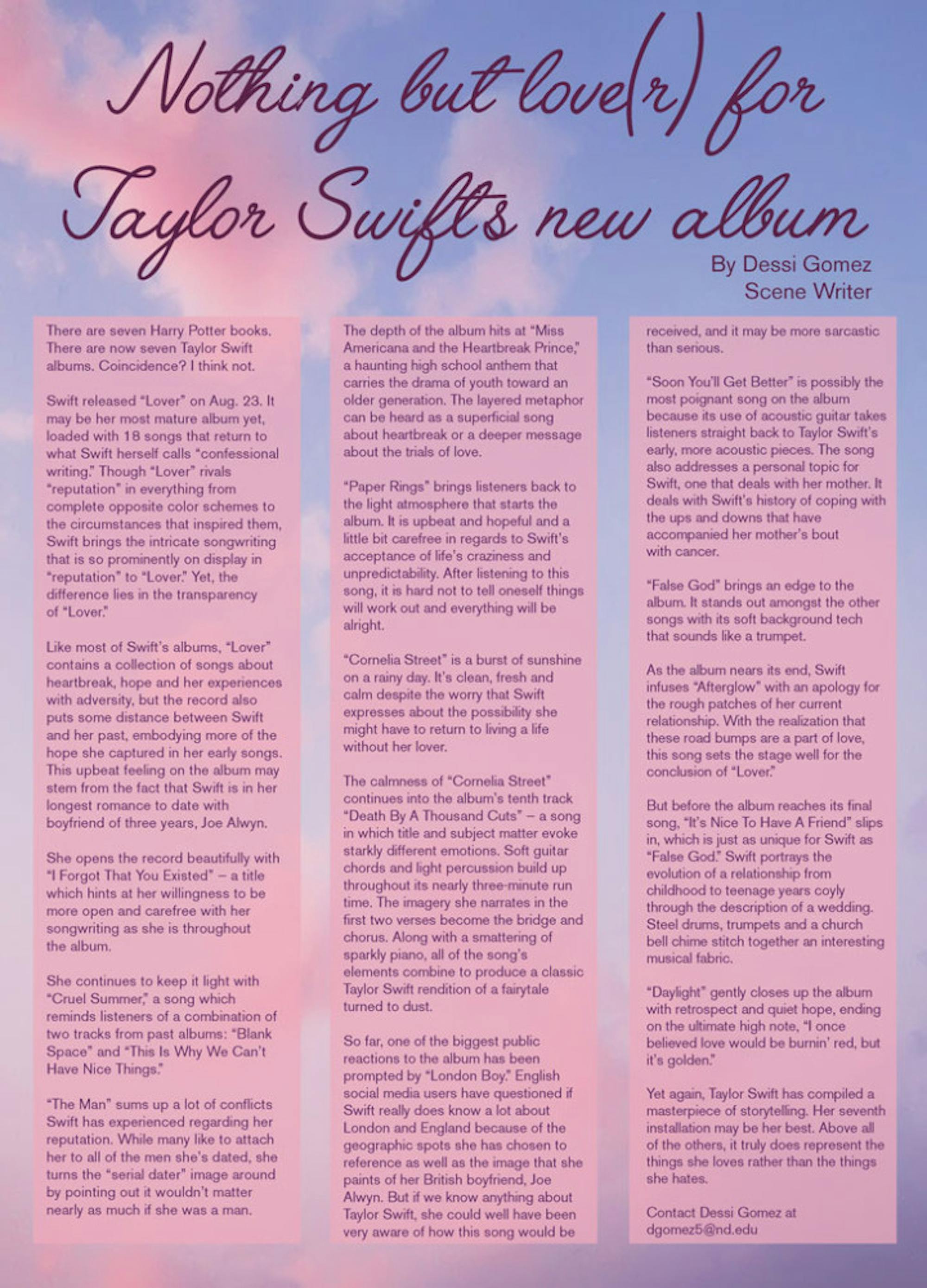
There are seven Harry Potter books. There are now seven Taylor Swift albums. Coincidence? I think not.
Swift released “Lover” on Aug. 23. It may be her most mature album yet, loaded with 18 songs that return to what Swift herself calls “confessional writing.” Though “Lover” rivals “reputation” in everything from complete opposite color schemes to the circumstances that inspired them, Swift brings the intricate songwriting that is so prominently on display in “reputation” to “Lover.” Yet, the difference lies in the transparency of “Lover.”
Like most of Swift’s albums, “Lover” contains a collection of songs about heartbreak, hope and her experiences with adversity, but the record also puts some distance between Swift and her past, embodying more of the hope she captured in her early songs. This upbeat feeling on the album may stem from the fact that Swift is in her longest romance to date with boyfriend of three years, Joe Alwyn.
She opens the record beautifully with “I Forgot That You Existed” — a title which hints at her willingness to be more open and carefree with her songwriting as she is throughout the album.
She continues to keep it light with “Cruel Summer,” a song which reminds listeners of a combination of two tracks from past albums: “Blank Space” and “This Is Why We Can’t Have Nice Things.”
“The Man” sums up a lot of conflicts Swift has experienced regarding her reputation. While many like to attach her to all of the men she’s dated, she turns the “serial dater” image around by pointing out it wouldn’t matter nearly as much if she was a man.
The depth of the album hits at “Miss Americana and the Heartbreak Prince,” a haunting high school anthem that carries the drama of youth toward an older generation. The layered metaphor can be heard as a superficial song about heartbreak or a deeper message about the trials of love.
“Paper Rings” brings listeners back to the light atmosphere that starts the album. It is upbeat and hopeful and a little bit carefree in regards to Swift’s acceptance of life’s craziness and unpredictability. After listening to this song, it is hard not to tell oneself things will work out and everything will be alright.
“Cornelia Street” is a burst of sunshine on a rainy day. It’s clean, fresh and calm despite the worry that Swift expresses about the possibility she might have to return to living a life without her lover.
The calmness of “Cornelia Street” continues into the album’s tenth track “Death By A Thousand Cuts” — a song in which title and subject matter evoke starkly different emotions. Soft guitar chords and light percussion build up throughout its nearly three-minute run time. The imagery she narrates in the first two verses become the bridge and chorus. Along with a smattering of sparkly piano, all of the song’s elements combine to produce a classic Taylor Swift rendition of a fairytale turned to dust.
So far, one of the biggest public reactions to the album has been prompted by “London Boy.” English social media users have questioned if Swift really does know a lot about London and England because of the geographic spots she has chosen to reference as well as the image that she paints of her British boyfriend, Joe Alwyn. But if we know anything about Taylor Swift, she could well have been very aware of how this song would be received, and it may be more sarcastic than serious.
“Soon You’ll Get Better” is possibly the most poignant song on the album because its use of acoustic guitar takes listeners straight back to Taylor Swift’s early, more acoustic pieces. The song also addresses a personal topic for Swift, one that deals with her mother. It deals with Swift’s history of coping with the ups and downs that have accompanied her mother’s bout with cancer.
“False God” brings an edge to the album. It stands out amongst the other songs with its soft background tech that sounds like a trumpet.
As the album nears its end, Swift infuses “Afterglow” with an apology for the rough patches of her current relationship. With the realization that these road bumps are a part of love, this song sets the stage well for the conclusion of “Lover.”
But before the album reaches its final song, “It’s Nice To Have A Friend” slips in, which is just as unique for Swift as “False God.” Swift portrays the evolution of a relationship from childhood to teenage years coyly through the description of a wedding. Steel drums, trumpets and a church bell chime stitch together an interesting musical fabric.
“Daylight” gently closes up the album with retrospect and quiet hope, ending on the ultimate high note, “I once believed love would be burnin’ red, but it’s golden.”
Yet again, Taylor Swift has compiled a masterpiece of storytelling. Her seventh installation may be her best. Above all of the others, it truly does represent the things she loves rather than the things she hates.









